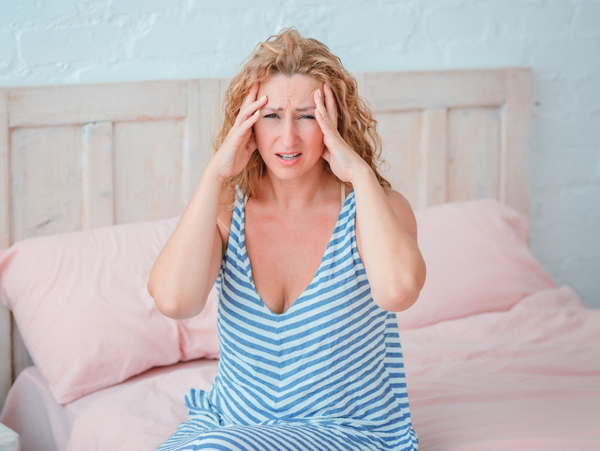Signs of hypothyroidism and hyperthyroidism can be easily missed but if you’re feeling fatigued and frumpy or anxious and overstimulated, your thyroid should be first on your investigative list.
Your thyroid is a butterfly-shaped structure of glandular tissue that sits in your neck, in front of your trachea, or windpipe.
Its purpose is to make, store and release thyroid hormone which the body uses to control a number of your body’s functions responsible for multiple functions in the body, including:
- body temperature
- breathing/respiratory rate
- heart rate
- how quickly you burn calories
- digestion
- brain development + growth in babies
Thyroid problems can occur from different causes
The pituitary gland sits in the brain and sends Thyroid Stimulating Hormone (TSH) to your thyroid which then stimulates the thyroid to produce the inactive, or storage, thyroid hormone T4 (thyroxine), which then converts to active thyroid hormone T3 (triiodothyronine).
This is an important balancing act and when too much or too little stimulating hormone is sent, with too much or too little a thyroid hormone being made, we may see conditions of sub-clinical hypothyroidism, or generally termed hypo- (under functioning) or hyperthyroidism (over functioning).
If there’s an autoimmune aspect to the thyroid gland’s unstable behaviour, we see hashimotos (autoimmune hypothyroidism) or graves disease (autoimmune hyperthyroidism)
Toxic chemicals in our environment play havoc with our thyroid gland. In particular Bisphenol A (BPA) from plastic drinking bottles and storage containers and Triclosan found in antibacterial handwashes, toothpastes, skin care products and plastics. It’s so important we try to detoxify our environment to protect this sensitive gland.
Need some inspiration? Check out My Chemical Free Romance, Low Tox Life and Nourished Life
Conversion of T4 to the active hormone T3 can be disrupted by…
- vitamin A, C and B12 deficiency
- iron, zinc and selenium deficiency
- iodine deficiency
- lack of salt in the diet
- the contraceptive Pill
- antidepressant medications such as SSRIs and lithium
- Bisphenol A (BPA)
- fluoridation
- chlorination
- non-fermented soy
Fatigue is a key feature of thyroid conditions. However, if you’re fatigued in the morning (and haven’t just had an allnighter!), think thyroid. If your fatigue hits later in the afternoon, adrenals may be the culprit.
Signs of Hypothyroidism
- Fatigue
- Low energy
- Hair loss or thinning (especially along the frontal hair line)
- Cold hands + feet
- Poor circulation
- Anaemia
- Dry skin
- Puffy skin/face
- Goiter
- Last third of your eyebrows missing
- Weight gain or difficulty in losing weight
- Feeling the cold
- Swollen tongue (with scalloped edge/teeth marks on the periphery)
- Swollen top of the wrist
- Frequent and/or heavy periods
- Depression
Signs of Hyperthyroidism
- Anxiety
- Stress
- Restlessness
- ADHD
- Rapid weight loss
- Palpitations
- Insomnia
- Hot flushes or feeling hot
- High blood pressure
- Irregular or infrequent periods
Disease risks associated with thyroid conditions
- low-functioning thyroid (hypothyroid) is linked with a 260% increase in coronary heart disease
- presence of thyroid antibodies (indicating the presence of an autoimmune-based thyroid condition) is linked with a 3.9% increased risk of miscarriage
- high cholesterol may correlate with thyroid problems
To accurately test thyroid function, it’s not enough to just test TSH
The optimal TSH range in a pathology test is between 1-2 mIU/L, around 1 mIU/L is ideal (conventional pathology can show as high as 5 mIU/L as normal range, which means there are a LOT of women out there with an under-functioning thyroid and not realising why they’re feeling so tired and flat.)
To understand what is happening to your hormone levels and why, we need not just this TSH level, but a full thyroid panel, including TSH, T3, T4, rT3 and thyroid antibodies.
Other useful indicators include a spot urinary iodine or iodine loading test (the topic of iodine is a whole new post!), toxic metals, DHEAs, selenium, zinc, B12 and Vit A.
Kate is a qualified naturopath who is passionate about helping women heal from hormonal havoc and inspiring women to know their own power, worth and wisdom.
Kate offers one-on-one Skype consults for irregular cycles, PMS and period pain, endometriosis, PCOS, hypothyroidism, peri-menopause, mood swings, fatigue and mental and emotional stress.
Simply drop me an email to see how I can help you!







